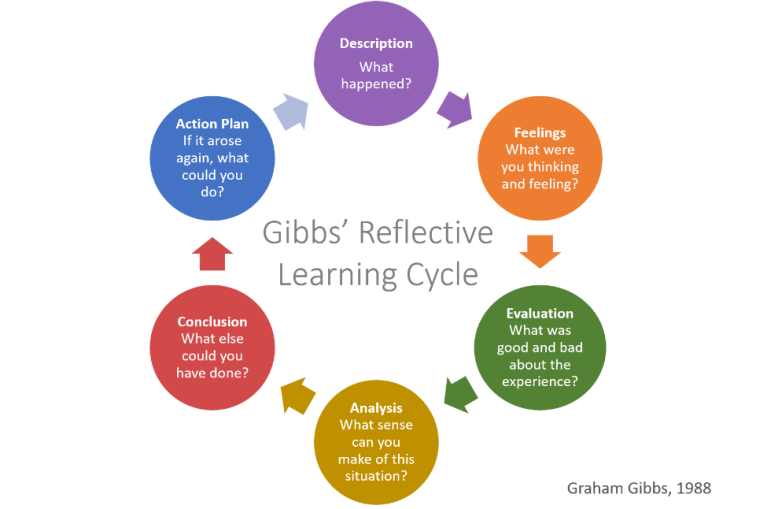| Word Count | 250-word |
|---|---|
| Assessment Title | Reflection |
As part of your Employability Skills Log you are required to write and submit a 250-word reflection. Your submission should also include a link to your website or alternative record of your Employability Skills Log as well as a live link to your completed Employability Skills Log Form.
Reflective writing is a crucial academic skill that helps you critically analyse your experiences, examine your learning process, and develop critical thinking abilities. Building your ability to reflect critically will be fundamental for your continued personal and professional growth, during your time at RUL and beyond. This guide offers you an overview of what reflective writing is, how to approach reflective writing, and provides you with further resources and examples to master the art of reflective writing.
Reflective writing involves examining your experiences, thoughts, and feelings about a particular event, learning experience, or observation. Unlike traditional academic writing, it uses first-person perspective and encourages personal insight while maintaining academic rigor and analytical depth. The key to do proper reflective writing is to be analytical rather than descriptive. This means asking “Why?” rather than just describing what has happened during an experience.
Your reflective writing should demonstrate clear analysis rather than just description. In reflective writing you are including your thoughts, feelings, and reasoning about what happened, what you learned, and how it will influence your future actions. It is important to consider both the positive and negative aspects of an experience. You can support your insights with relevant academic theories, concepts, or references to other material when appropriate. However, most importantly, reflective writing will be about you, your own experience, and your own thoughts and feelings – this means nobody (not even AI) can do it for you!
To guide you in your reflective writing journey and help you start with the process, you can make use of different models or frameworks which were developed over the years. For your reflective writing, you may want to adopt one of the two following models which can both help organise your reflective writing. Which model you adopt is your choice but consider that the second (Gibbs’ Reflective Cycle) may allow you deeper reflection and may thus be more appropriate to use as you develop your skills further.

A simple but effective model developed originally by Driscoll (1984) and later developed by Rolfe et al. (2001) that helps you describe what happened, let’s you analyse the significance of what happened, and prompts you to consider future implications of what happened. As the name suggests, you must answer the three questions:
For a more detailed description of what each questions should include, please check out the Reflection Toolkit provided by The University of Edinburgh, and the specific advice (including examples) on the What? So what? Now what? Model. Additional links to further reading on Rolfe et al.’s model and reflective writing in general can be found below.
Are You Looking for Answer of This Assignment
Request to Buy AnswerGibbs’ Reflective Cycle is one of the most famous models for reflective writing, introduced by Graham Gibbs in 1988. The model consists of six stages through which you explore and reflect on one of your experiences. They are:

For a more detailed description of what each of the six cycles should include, please check out the Reflection Toolkit provided by The University of Edinburgh, and the specific advice (including examples) on Gibbs’ Reflective Cycle. Additional links to further reading on Gibbs’ model and reflective writing in general can be found below.
While you may structure your reflective writing by using one of the models above, the following questions should be covered in any reflection. If you apply the models correctly, the below could be a handy checklist for you before submission:
Finally, always remember that effective reflective writing is a skill like most others, and it will be developed with practice. Every time you reflect and every time you note down your reflections, you should demonstrate and witness growth in your understanding and ability to analyse experiences critically.
Achieve Higher Grades This Assignment & Raise Your Grades
Order Non Plagiarized AssignmentNeed help with your Employability Skills Log – Reflective Writing Guide? You are at the right place. Our platform provides the best assignment help. We have talented writers who can provide assignments without any plagiarism and 100% original content. You are assured that our Reflective Essay Writing Service will make you productive and help you achieve high grades in your academic year. No doubt about it! We also provide free sample assignments for your guidance. Contact us now!
Hire Assignment Helper Today!
Let's Book Your Work with Our Expert and Get High-Quality Content
